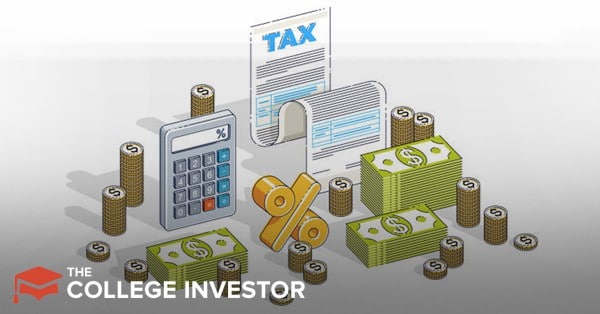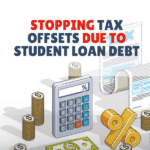
For anyone getting a refund, tax season is the best time of year. But for those who have defaulted on their federal student loans, their potential joy can be seized by the IRS to pay down the federal debt. This is called a tax offset.
It may not currently be tax season, but it’s never too early to start preparing to secure that refund. Specifically, if you have federal student loans that you’re behind on, it’s in your best interest to get in good standing before the Department of Education decides to collect your tax refund.
If you’re worried about the IRS taking your tax refund, you’re in the right place.
Note: The Department of Education stopped collection activity (including tax offsets) through the payment pause. Student loan payments resumed in September 2023, but due to the Fresh Start program, collection activity like tax offsets won't resume until October 2024.
If you're not quite sure where to start or what to do, consider hiring a CFA to help you with your student loans. We recommend The Student Loan Planner to help you put together a solid financial plan for your student loan debt. Check out The Student Loan Planner here.
The Basics of Tax Offsets
First, tax offsets are legal. The Treasury Offset Program, created in 1986 and overseen by the Bureau of Fiscal Service, allows departments of the federal government to request that the IRS seize tax refunds to pay down debt owed to the federal or state governments.
Unlike for private loans, the federal government doesn’t need permission from anyone to garnish your earnings, including your tax refund, if you have defaulted on your federal student loans.
In the case of federal student loans, the Department of Education may send the Treasury a request to seize your tax refund to put toward defaulted loans. If they do this, they can take your entire tax refund. If the debt is paid off and any amount of your refund remains, it will be returned to you.
If you have a spouse with whom you file your taxes jointly, the IRS can seize the entire joint tax return, even if your spouse is not connected to your federal student loan. However, it is possible to get your spouse’s portion of the refund returned to him or her.
It’s important to note that, because there is no statute of limitations for federal loans, the IRS can offset your taxes for every year your federal student loans are in default.
Fortunately, the IRS is legally required to notify you by mail of their proposal to offset your taxes and allow you some time to respond.
If you have federal student loans that are in default, you may receive a letter in the fall notifying you that the IRS plans to take your potential tax refund and apply it to your education debt. The letter will include information about your loans and instructions on how to proceed.
Once you get the letter, you can do one of three things:
1. Request a review to challenge the offset.
2. Agree to pay the debt.
3. Do nothing.
Request a Review to Challenge the Offset
First, check all the information in the letter against your records and your loan accounts. You can even request an official copy of your loan information from the Department of Education. If anything looks incorrect, you have the right to request a review hearing, where you’ll have the opportunity to prove that your taxes should not be offset.
Here are some common reasons you might request a review hearing:
Challenging the offset can be difficult, so you need very compelling proof. If you’re set on this course of action, consider hiring a lawyer and the costs of doing so.
Agree to Pay the Debt
If you've agreed that you owe the debt, that doesn't mean that you are expected to pay all of it all at once. You certainly pay if all if you are able, but we're guessing that if you're here, you're not able to do that.
Instead, you can enter into a written agreement with the Department of Education to pay the debt. How will you pay the debt? First, you'll need to take steps to remove your loans from default. That could include default rehabilitation or consolidation.
After that, we suggest looking into federal repayment plan options so you avoid defaulting again in the future.
Of the various repayment plans offered by the Department of Education, borrowers who default would likely benefit most from income-driven repayment plans. In those plans, your payment amount is calculated each year based on your income and family size and can be as low as zero. Plus, after 20 to 25 years, any remaining balance is forgiven.
Of course, do thorough research before enrolling in any repayment plan. None of them are one-size-fits-all so make sure the one you choose works for your situation.
Do Nothing
If you choose not to take action, miss the deadlines to take action, or never received a letter warning you of the proposed tax offset, the IRS will take your tax refund. Thankfully, you’re not completely out of luck at this point.
If you believe your refund was taken in error, you can reach out to the Department of Education (not the IRS) to contest the offset. See the list above of common reasons to request a review hearing for the types of errors that would get your refund returned to you.
If your refund was not taken in error but you can prove financial hardship, you may be able to get at least a portion of the refund returned to you. This method is very difficult and is not guaranteed to be successful.
If you filed your taxes jointly with your spouse, he or she can file an “injured spouse” claim to get his or her portion of the tax refund returned. Learn more about filing Injured Spouse Form 8379 here.
Private Loan Tax Offset
If you have private loans and you fall behind, you don’t have to worry about not getting your tax refund; collectors of private loans have no way to seize the refund. However, your private loan servicer can take action to collect your loans much sooner than federal servicers can. Unlike federal servicers that can’t take collection action until loans are 270 days past due, private servicers can take collection action as soon as you’re late on just one payment.
If your private loans are delinquent, your private loan servicer can sue you for the ability to garnish your wages and freeze your bank account. Court approval is the only way a private servicer can take your earnings, so you have a much better chance of preventing it if you show up to court with a good defense.
How to Prevent Tax Offsets
If you’re approaching or in default on your federal student loans, it’s best to take action so they are not still in default come tax season. That means either curing the default through default rehabilitation or consolidation or entering into a repayment plan with more affordable monthly payments so you can work to stay current.
And right now, with student loan payments resuming, you can take advantage of the Fresh Start program to get out of default easily. Learn more about Fresh Start here.
If you're not quite sure where to start or what to do, consider hiring a CFA to help you with your student loans. We recommend The Student Loan Planner to help you put together a solid financial plan for your student loan debt. Check out The Student Loan Planner here.
We break down the process to get out of default here: How To Get Out Of Student Loan Default In 5 Easy Steps.
We'd appreciate hearing your thoughts and experience in the comments below.

Robert Farrington is America’s Millennial Money Expert® and America’s Student Loan Debt Expert™, and the founder of The College Investor, a personal finance site dedicated to helping millennials escape student loan debt to start investing and building wealth for the future. You can learn more about him on the About Page or on his personal site RobertFarrington.com.
He regularly writes about investing, student loan debt, and general personal finance topics geared toward anyone wanting to earn more, get out of debt, and start building wealth for the future.
He has been quoted in major publications, including the New York Times, Wall Street Journal, Washington Post, ABC, NBC, Today, and more. He is also a regular contributor to Forbes.
Editor: Claire Tak Reviewed by: Chris Muller
